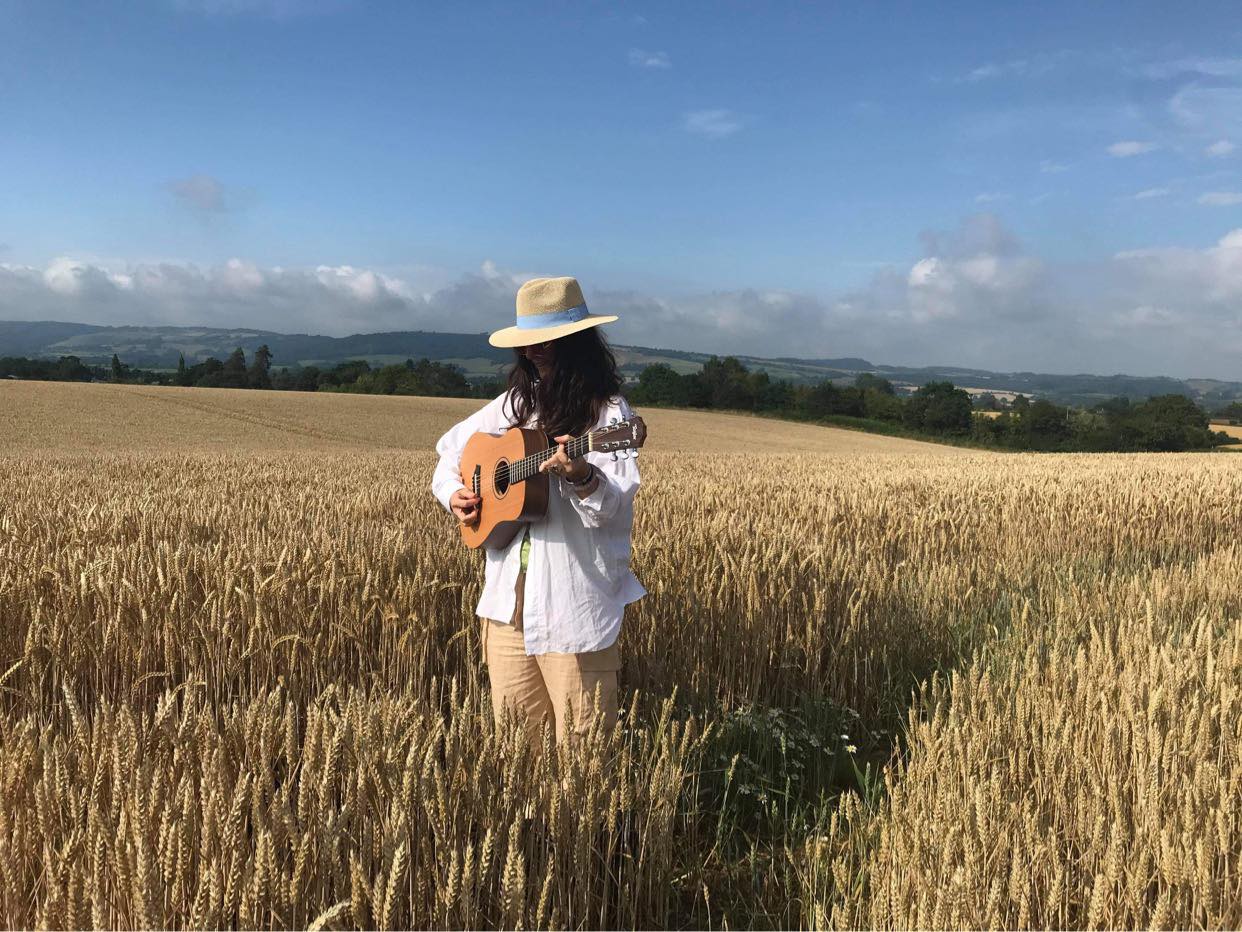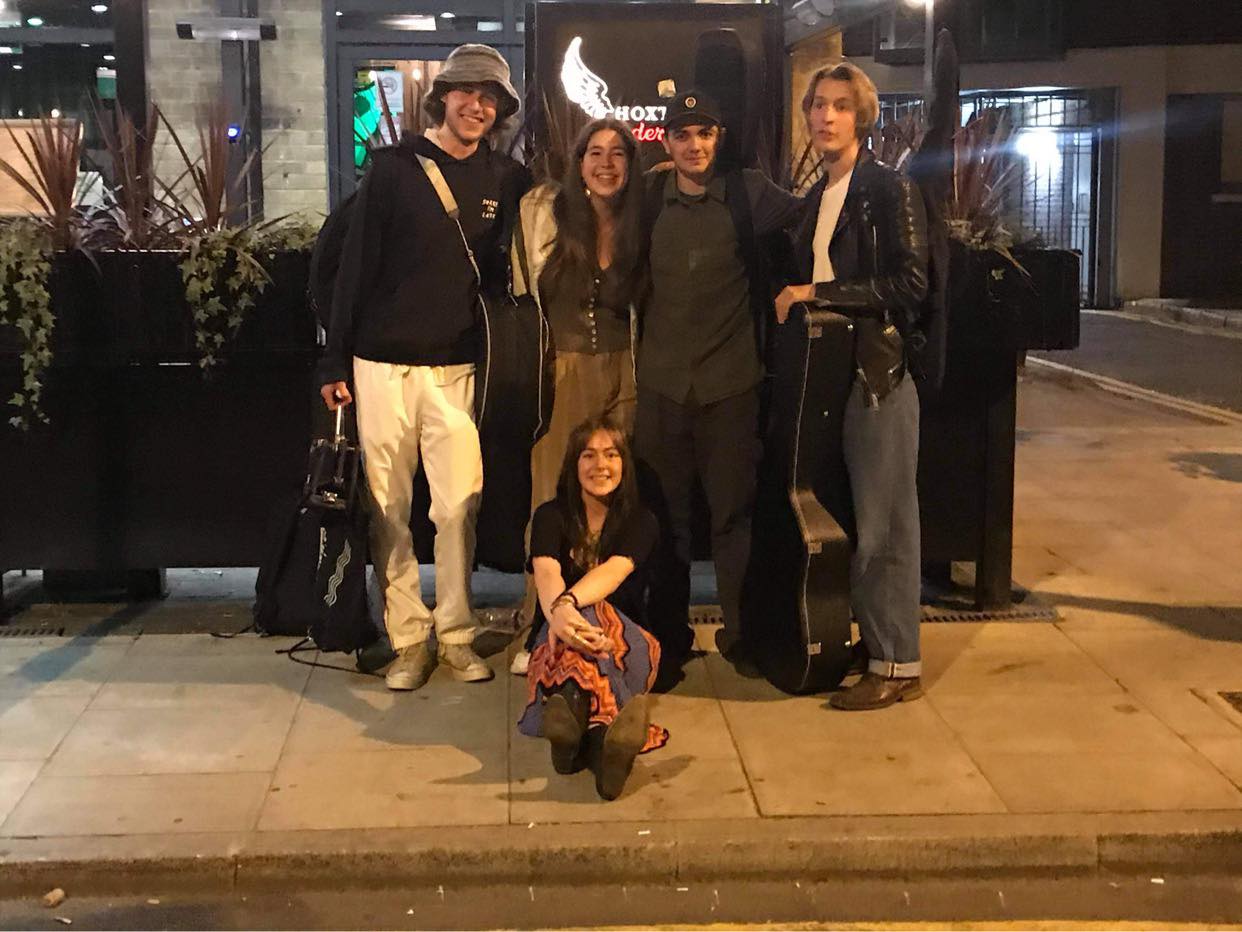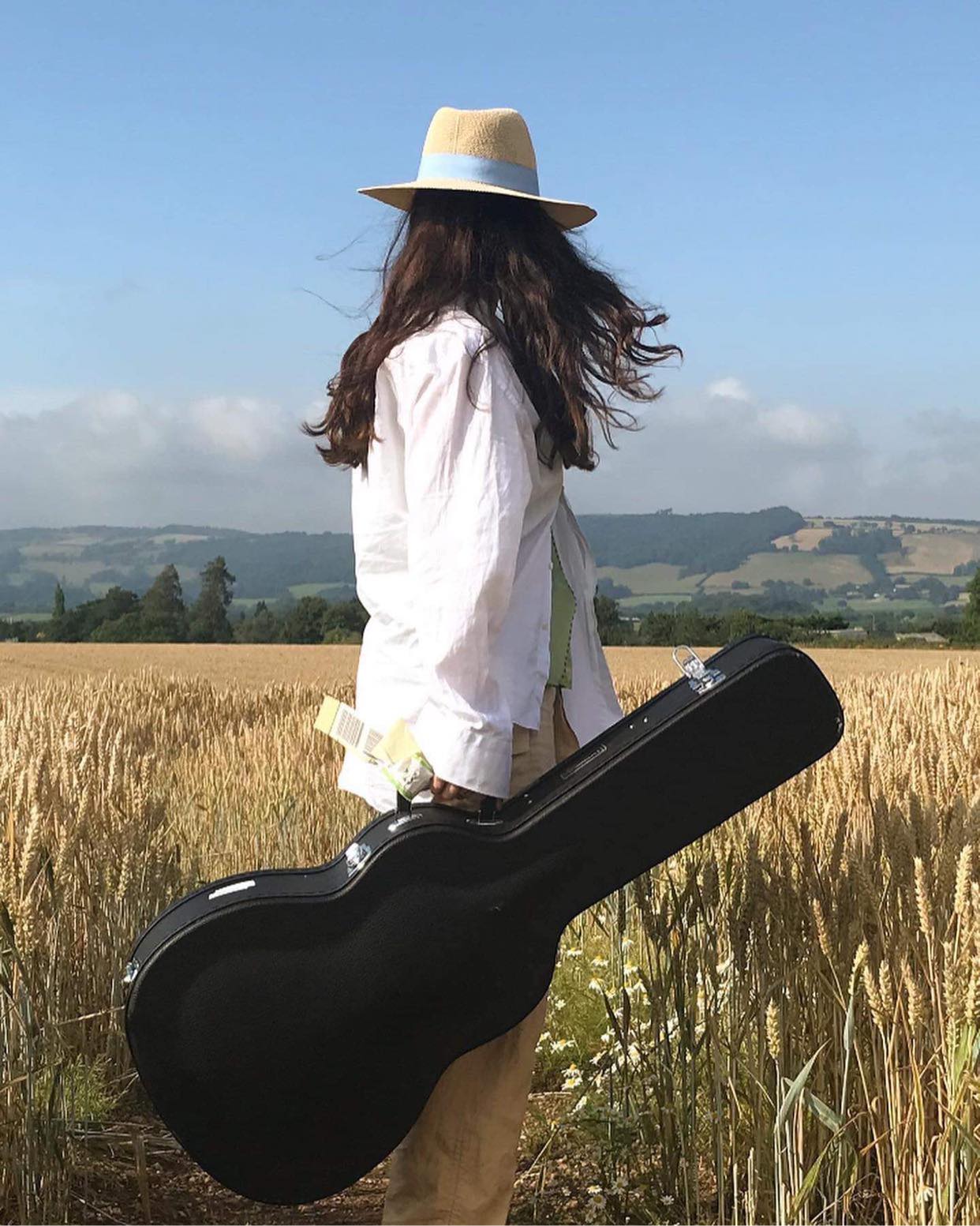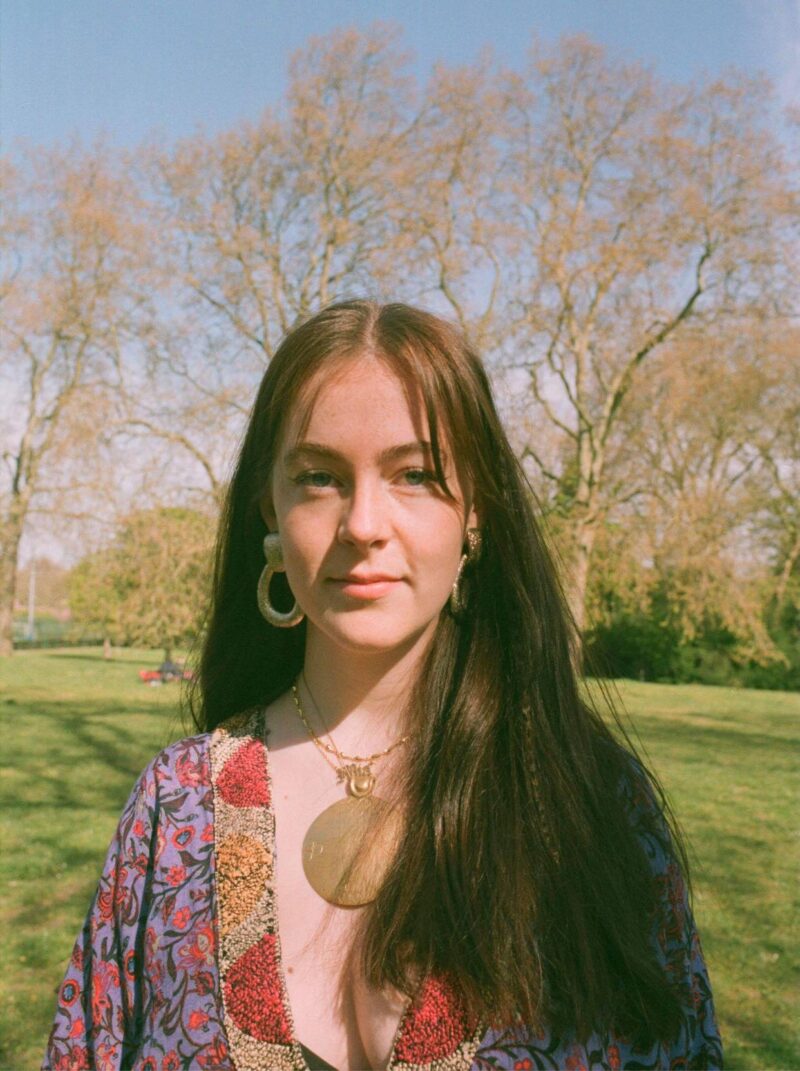MATILDA SYKES catches up with singer/songwriter MIA ELISABETH, discussing the potential catharsis of music for both artist and audience, and the paradoxical notion of intimately personal subject matter connecting with a more universal experience.
Inspired by artists such as Carole King and Joni Mitchell, Mia Elisabeth’s music is consistently vulnerable and honest. Mia uses music to emotionally expunge and clarify, with the ultimate goal of storytelling through melody and words. Up until now Mia has performed and released songs alongside her sister Poppy (you can listen to their mellifluous harmonies on Spotify: Mia & Poppy). While they will always sing together, they are beginning to explore their own creative and musical interests, which brings us to ‘Mia Elisabeth’. Her upcoming releases on Spotify are under this new name, songs that look at love through the lens of soul-music. Mia counterpoises weighty lyrics with more upbeat jazz, soul, and R&B tempos. Each song tells the story of a specific moment or feeling, often with diary-like specificity, drawing the listener into new emotional landscapes while at the same time universalising experience by drawing on commonalities.
Mia has recently returned to do a degree in History of Art at UCL after having trained as a professional painter in Florence for three years. Adoration for both cities and their artists is evident in her music. Mia makes frank statements on the personal relationships that have formed and fallen in her life over the past few years, reminiscent of artists such as Pip Millet, Jorja Smith and Chet Baker. She presents all of herself in her music, viewing vulnerability as strength and openness as toughness – she recognises the ‘power in showing the cracks’.
So what is it about folk music that appeals to you?
So. My dad is a massive music junkie. We went to musicals and live gigs every year, and whenever we’d go I’d always cry because I wanted to be the one performing. Growing up, we’d go to Cornwall every summer, and in the car we’d only have four CDs that you couldn’t change: James Taylor, Joni Mitchell, Simon and Garfunkel and Carole King, all the best singer songwriters. So for me, lyrics were the main thing.
Is your dad musical then?
No, he played the French horn (really random). My mum’s family have this amazing passion for classical music and my dad’s side have been in various choirs for many years: but I think my sister has been my biggest musical inspiration. But after doing those car journeys and just listening and learning, I caught onto interpreting lyrics really quickly, and started writing poetry. And then every time a family member would come round to our house, my parents would make Poppy and me sing for them.
A capella?
A capella. Weird little things that we’d written. This is around seven years old. We were so shy, so at the beginning we’d hide behind the door in the living room, our little voices just about projecting out.
When did you start playing guitar?
I learnt at ten. I tried piano, but it didn’t fit. And then I went to school and saw someone playing guitar and I was like ‘You must teach me’. She taught me four chords and then I basically taught myself – I’ve never been properly trained.
Considering your family weren’t musical there had to be a certain amount of conviction on your part. Guitar… everyone drops guitar.
That was me and piano. I did that for eleven years and I cannot play a single note. After that I presumed music wasn’t my thing. Then we went to this mall, in Dubai. I was seeing my family because they live there and I found this ten dollar guitar. It was so bad and absolutely enormous. I was this scrawny little kid, couldn’t even put my arm over the guitar. I remember just doing it until my fingers bled.
Pretty proud of your calluses?
So proud. And different length nails on either hand.

What’s more of a struggle, the songwriting or the guitar playing, or have they both evened out?
They come hand in hand. But I can never just sit down and write a song. It’s more like ‘I’m feeling this way, I need a catharsis. How am I going to deal with it?’
I was going to say – your songs are very tender, emotionally intimate. They have that folky confessionalism, someone specific clearly at the forefront of your mind. But do you find that that individual disappears over the course of the creative process? Or do they remain?
Thank you, that’s such a compliment. They remain. If you point out a song I can tell you the exact moment, exact time in my life that that was going on, and the exact person the song is about. It’s very specific.
Does the experience of discussing the music by taking it to the band, changing it round, recording it, and releasing it, mean it accrues new memories that distances it in any way?
I think it depends on what the song is, because if it’s a painful song, then I naturally do that. I don’t want to associate the person with the song because I feel like they’ll have more power over it. But if it’s a song that I have really fond memories about, I want to remember the person it’s about because that will then inform the performance. I’ll try hard to keep that face in mind.
About the power over the song… as though it becomes not yours almost?
Exactly. I get quite scared, especially because they are very personal. And they’ll hear it! I wrote one the other day about my best friend’s cousin who I went on a few dates with. When I played it to her she said, ‘You can’t release this! It’s so obvious!’ But I will. When I listen to music I resonate with it so much more when it’s really honest and open. Especially over the last year, I’ve been less prone to shy away from things. Let’s not kid ourselves, I’m not famous – it’s not like hundreds of thousands of people are going to hear it and be like ‘Oo, that girl Mia!’ It’s pretty much my friends and family.

You list Laura Marling as an inspiration. I read an interview the other day where she said of her own music, ‘[Listeners] hear something uncanny, something that’s nearly them, but not quite. But it makes them feel understood’. I think that sentiment is applicable to your music also. It’s open to other people seeing themselves in it. What do you hope your music will do for the listener, if anything?
Laura Marling and Johnny Flynn are the two other folk singers that I was obsessed with when I was around twelve. I always try to start with a really personal thing and go off my own experience, but try to address it in a way that then could be picked up by someone else. I went through a really bad breakup in January and during that time the music I was listening to was very different to the music I would usually listen to – basically all break up songs. Breaking up is a pretty universal experience, so after every single song I’d think ‘Oh my God, this person knows exactly what I mean’. And so, after that, I have tried to make my songs relatable, whether happy or sad.
Do you find it easier to write sad or happy songs?
Sad and reflective songs I think! They have very different processes. When I am in a relationship I find it more difficult to write because I confide in the person rather than the music. So at the moment I’m writing more than I’ve ever written, which is a beautiful thing!
Always the way. I love ‘As Long as You’re Happy’.
That’s probably my saddest, but it’s one of my favourites. That literally took five minutes, it just bled onto the page.
How did Covid affect your music? I imagine in some ways it was quite helpful and in others, not?
I found it the worst thing in the world. I don’t know how everyone was really inspired because I wrote nothing. I basically didn’t play guitar for the whole thing, really. I didn’t paint. I did nothing that I love because I just felt so uninspired. I think the moment it stopped was the first day I wrote a song in like eight months. The day that it lifted. What I write is really inspired by experiences and I just wasn’t having any. I find it quite hard to go back on memories and write about them now. I didn’t want to write another song that was like ‘Oh, I’m bored in my house’. It just seemed inappropriate, and not healing for anyone, myself included.
Where did you meet your band?
I met Freddie our amazing guitarist in Florence, and Leo, our drummer, producer and all-round creative, through a mutual friend. Then Leo introduced me to Kielan, our incredible bassist . So all very random connections; none of this would be possible without them. And obviously Pops, whose harmonies are ethereal. Music’s always been fun for me, but through meeting them all and working with them over this past year there’s been a massive realisation of ‘Oh, maybe you could actually do this’.

How often do you manage to get together?
Not that often. We had our first gig post lockdown in May, and we only rehearsed once all together before the gig. But they are just so incredibly talented. I’m not the best at writing sheet music and Keelan, the bass player, literally heard it once was like, ‘Oh yeah, got it’, transcribed five pages of music and then literally did the whole song. The whole folk thing of two voices and a guitar has now kind of morphed. Since meeting these really talented musicians, my style has gone down a kind of jazzy, R&B route.
What’s the hardest song you’ve ever written? Whatever that means to you.
There’s this one song called ‘Bad Out of Me’, one of the new ones, which I’m really excited about. The lyrics ‘I may get teary sometimes. So why don’t you try and hug it out of me’ speak to this idea of not always having someone else to squeeze the pain out. I was in a very dependent relationship and at the time didn’t realise it was a bad thing. It just felt like ‘Oh, we’re in love’. Then I left and realised I needed to be able to do it for myself.
Even in writing the song, you’re answering its demands I suppose.
Completely. That’s why I love it. I have lots of artistic endeavours and passions, but none of them give me the feeling music does.
Dream venue?
Ok, weirdly, Hammersmith Apollo. And The Jazz Cafe. Hammersmith Apollo because I’ve driven past it all my life. I’d always see the names on the outside, and every time I got older, the people started getting more my age – like recently seeing Arlo Parks up there. I have this bittersweet thing of being proud of that person and also feeling frustrated, thinking ‘I really want to do that as well!’ And then Jazz Cafe because I went there for the first time recently, and it’s such a hub for jazz and incredible music.
Quite intimate as well, which is nice.
Very intimate. And I quite like that. My mum once said, ‘If you can see the whites of their eyes in the audience, that’s how you know, because they can’t hide it. If they hate it you can tell’.
Have you ever had the person you’re singing about attend the gig?
Yeah. I actually had the mum of the guy that I had written about at one gig. Quite a cheeky song as well. And the next day she texted me ‘Oh Mia, it was so beautiful. I listen to the song every morning when I wake up’. It was quite an inappropriate song! Bless her, it was lovely. It’s called ‘65’.
Dead or alive, who would you like to collaborate and write an album with?
Can I choose three people? Jack Antonoff, an American songwriter. Writes for Clairo, John Mayer, Taylor Swift, everyone. He’s incredible. Then Joni surely, Joni Mitchell. And Carole King.

What are your plans for the future?
So, next big thing is I’m going to Greece to do a writing residency.
You’re like Leonard Cohen!
Yes! I’m going to Hydra for two weeks, in old LC’s recording studio, The Old Carpet. His house is next door. It’s going to be amazing. I’ll hopefully get loads of good stuff from that. And then when I’m back we can have another gig in September. Everyone be there!
So when’s the new album coming out?
Hopefully this year, before the end of the year. It takes a very different turn.
You can catch Mia Elisabeth perform on September 14th at Colours Hoxton at 19:30. Tickets available through TicketWeb.
You can follow Mia on Instagram: @_miaelisabeth_
Featured image courtesy of Nico Lethbridge.





